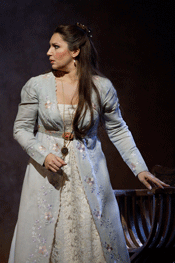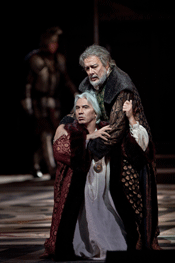The high jinks of opera were a thing he could never
quite take seriously as music-making, perhaps because the melodramatic aspects
of it, the colorful costumes and all that, offended him. He was also said to
have a serious drinking problem, but let that pass. Simon Boccanegra,
on its not infrequent Met revivals, came in for especial opprobrium: Drunk or
sober, he could never make head or tail of the plot, and yet he would spend
three or four paragraphs puzzling it through, mentioning the singers as an
afterthought.
 Barbara Frittoli as Amelia
Barbara Frittoli as Amelia
There probably aren’t many people who go to Verdi operas for the sake
of the plot, and if there are, Simon Boccanegra, which has a great
deal of plot but doesn’t tie neatly together, is not the work to begin
with. Verdi was intrigued by its moments of charged drama but he didn’t
bother to fit the rest into a clear pattern. Those high points (Simon stumbling
on his lover’s body in the dark and, a moment later, being acclaimed as
Doge; Simon realizing that Amelia is his long-lost daughter; Simon quelling his
riotous subjects in the Council Chamber scene while Amelia trills gorgeously
over a ground bass of crowd noise; Simon dying of poison just as his daughter
and son-in-law return from the nuptial altar) should be sufficiently exciting
to quash your questions and carry you along. If they are not—if they are
not well sung and played, or if you insist on puzzling through untied ravels of
story—you are not going to have fun at Simon Boccanegra.
In recent years, Boccanegra has not always been cast to strength.
There have certainly been worse Amelias than Barbara Frittoli, whose voice has
the proper weight for a Verdi soprano, but her tone turns white and flat up top
and she cannot sing softly up there (as every later Verdi heroine must be able
to do). Too, she lacks that all-important trill. RamÛn Vargas sings Gabriele
Adorno with impressive urgency and well-judged voice placement, but the voice
itself is no longer the lovely lyric tenor of ten years ago. Dmitri
Hvorostovsky (in black wig for the prologue, his natural white locks for the
remainder of the opera, set twenty-six years later) sings Simon the way he
sings all Verdi: beautiful phrases with highly inappropriate gasping for breath
in between them. This was not true when I first heard him sing this role, in
Houston, a hall half the size of the Met, but it is always true when he sings
Verdi at the Met. The house is too big for him or he just has not grasped how
to produce Italian line here. But what other Verdi baritone does the Met have
nowadays to take on the role?
Simon is a feast for low male voices. Ferruccio Furlanetto’s
Fiesco had the same effect on the occasion that his King Philip had on the
recent Don Carlo: Whenever he opened his mouth, the entire remainder
of the cast seemed to sink into a provincial background, and we found ourselves
in the presence of world-class singing. His acting, too, is full of dignity and
pointed gesture, in the teeth of the absurdities required of Fiesco by director
Giancarlo del Monaco. Fiesco is all about darkness and dignity, but del Monaco
missed that memo and makes him a hysterical lout, raising his sword and roaring
ineffectively around the stage at any opportunity. Furlanetto, purely by his
low, velvet tones, reminded us that Fiesco is much more than that. Question to
the Met: Why not give him Boris Godunov, a role that calls for just this sort
of patriarchal authority? He sings the part to acclaim in out-of-the-way towns
like Vienna and Venice.
 Dmitri Hvorostovsky in the title role and Ferruccio Furlanetto as Fiesco
Dmitri Hvorostovsky in the title role and Ferruccio Furlanetto as Fiesco
The Met has been shorthanded in the Verdi baritone field of late, but Nicola
Alaimo, who made his first Met appearances as the murderous Paolo in this run
of Boccanegra, is a most impressive addition to the field. His voice
is dark and sizable, and he has no trouble projecting Paolo’s cynicism,
his humor and, later, his vengeful rage. Pietro, his cohort, was sung
effectively by the ever-useful Richard Bernstein.
James Levine had conducted the season’s first performance of this
opera last week, but by the next one, which I attended, he was evidently done
in by the previous day’s thrilling account of Das Lied von der
Erde with the Met Orchestra at Carnegie Hall, and he cancelled his second
Boccanegra. Standing in was John Keenan, new to me and in perfect
charge of the score: Each of Verdi’s sinister brass snarls came across
vigorously (Verdi invented this effect for Boccanegra and maintained
it for thirty years, through Otello). The flutes sounded lustrous as
clarinets in the father-daughter music, and quarreled nobly with the strings in
the daring disharmonies that underline civil dissent in Genoa. Keenan gave us
all the power and excitement required for Verdi but he never once drowned out
the singers.
Simon Boccanegra is set in fourteenth-century Genoa, indeed was
composed in part as Verdi’s tribute to one of his favorite cities, but
you’d never guess that from Giancarlo del Monaco’s colorful
production—which jumps over centuries in order to add color to a backdrop
here, a ceiling there, and even hops to Venice now and then for the sake of a
prettier set design. Different stage directors have reworked it over the years,
clumsily by and large. Peter McClintock, who was in charge this time, has rid
us of several awkward touches, and has persuaded the chorus not to move as if
they were a junior high school assembly when, in fact, they are rushing onto
the stage in a fury in order to overthrow the government.
John Yohalem
image=http://www.operatoday.com/BOCCANEGRA_Hvorostovsky_as_.gif
image_description=Dmitri Hvorostovsky as Simon Boccanegra [Photo by Marty Sohl courtesy of The Metropolitan Opera]
product=yes
product_title=Giuseppe Verdi: Simon Boccanegra
product_by=Amelia: Barbara Frittoli; Simon: Dmitri Hvorostovsky; Gabriele: RamÛn Vargas; Fiesco: Ferruccio Furlanetto; Paolo: Nicola Alaimo; Pietro: Richard Bernstein. Metropolitan Opera, conducted by John Keenan. Performance of January 24.
product_id=Above: Dmitri Hvorostovsky as Simon Boccanegra
All photos by Marty Sohl courtesy of The Metropolitan Opera